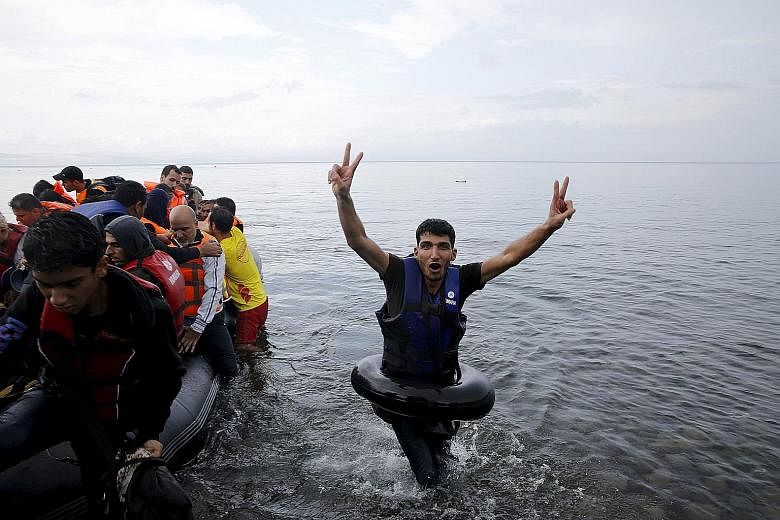European Union heads of government have failed to end months of recriminations about how to deal with their continent's unprecedented migration and refugee crisis, despite intense diplomatic negotiations this week.
As an emergency summit concluded yesterday morning, EU leaders vowed to respond to the "urgent need of refugees" by allocating a further €1 billion (S$1.6 billion) to international food and aid programmes, but did not reach consensus on common policies to either contain or manage the migration emergency.
EU president Donald Tusk spoke of the bleak political mood in Europe when he warned his fellow leaders that "the greatest tide of refugees is yet to come".
In theory, there is consensus about what Europe has to do: the continent has to strengthen its assistance to front-line states such as Greece and Italy through which most of the migrants come, coordinate border controls with Turkey, another major transit point, and speed up the processing of migrants already in refugee camps in Europe. In practice, EU leaders are at loggerheads on each one of these objectives.
Mr Jean-Claude Juncker, the head of the European Commission, the union's executive body, touted the idea of creating a "European force" to help Greece in policing its borders in the eastern parts of the Mediterranean by intercepting shiploads of refugees before they land on Europe's shores. But the practical and legal difficulties in creating such a force mean that, at least for the moment, nothing is being done.
The idea of getting Turkey's help in throttling the flow of immigrants does not appear workable either. For the Turks - who are turning a blind eye to tens of thousands of refugees daily crossing their territory on their way to Europe - see the immigration crisis as Europe's "just punishment" for years of neglect of the civil war in Syria.
Turkish Prime Minister Ahmet Davutoglu has now confidentially told EU leaders that he is willing to lend them a helping hand by interdicting the refugee flows. But the price which Turkey requires for this cooperation is steep: no less than a European agreement that Turkey will have a free hand to do more or less as it pleases in Syria.
That comes as a shock for European leaders who previously expected Turkey to be content with just offers of extra cash: as Mr Tusk, who spent last week huddled in negotiations with Turkish officials ruefully admitted, money "is not the big problem" in Europe's dealings with Turkey, for coordinating border controls with the Turks won't "be as easy as expected".
To make matters worse, there are no indications that the deep rift - between the western European members of the EU who want the refugees already in Europe allocated to all EU countries and the eastern Europeans who are adamantly against accepting asylum seekers - is being healed.
The East Europeans largely blame German Chancellor Angela Merkel for aggravating the situation by announcing at the start of the crisis that Germany's frontiers were open to all newcomers, something which allegedly acted as a magnet for further inflows of migrants.
But Dr Merkel not only refused to apologise for Germany's conduct at this week's summit; she continued to demand that it remains the duty of other nations to police the EU's outer frontiers, while at the same time criticising the East Europeans for not showing compassion to refugees.
The offer of extra cash to help with United Nations-administered aid effort for Syrian refugees in camps spread throughout the Middle East's neighbouring countries was touted by the EU as one sign of its new commitment to tackle the roots of the crisis. Yet, there was no pretence that this was anything but a palliative, a short-term measure that does not answer long-term pressures.
Pointing out that four million Syrians had fled to neighbouring countries, Mr Tusk suggested that EU governments should be prepared for "millions of potential refugees trying to reach Europe from Syria alone, not to mention Iraq, Afghanistan, Eritrea and other places".
The EU agreed to send its top officials back to Turkey for further negotiations, and also vowed to hold yet another summit on this topic next month.
But Hungarian Prime Minister Viktor Orban summarised this week's diplomatic efforts more realistically when he bluntly pointed out that "Europe's external border is still not defended".

